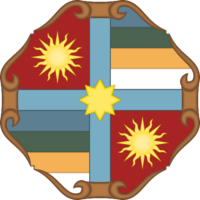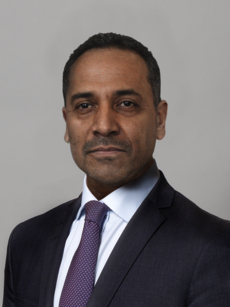Politics of Freice: Difference between revisions
No edit summary |
No edit summary |
||
| Line 170: | Line 170: | ||
Outside the Saltstil Pact, Freice maintains a cordial relationship with former colonial master Maricoen. Economic and cultural interactions have continued after independence and, although somewhat disrupted, beyond the socialist coup. Trade has remained stable and, with 4.6% of the population being of Maricoenian descent, the country remains an important part of Freician foreign policy. | Outside the Saltstil Pact, Freice maintains a cordial relationship with former colonial master Maricoen. Economic and cultural interactions have continued after independence and, although somewhat disrupted, beyond the socialist coup. Trade has remained stable and, with 4.6% of the population being of Maricoenian descent, the country remains an important part of Freician foreign policy. | ||
==Local government== | |||
Local government is divided into regional and tekbo governments. Tekbo governments are composed of the Tekbo Meetings and the Tekbo Councils (the legislatures and the executives respectively). They are elected by all registered voters in the tekbo community every year, under the same electoral rules that apply to all other elections. Tekbo Meetings and Councils address local issues such as the local planning, building control, council housing, refuse collection, recycling, and some leisure services and parks. Regional Meetings and Councils operate on a regional level, and are primarily concerned with economic development and transport. They are partly elected by the Tekbo Meetings and partly by the region's population every three years. | |||
Revision as of 19:53, 16 July 2021
 |
|---|
| This article is part of a series on the politics and government of Freice |
Since the 2021 Freician coup d'état, the politics of the Country of Freice (commonly known as Freice) takes place in the framework of a single-party socialist republic. Under the interim constitution of 2021, the sole legal party is the Common Wealth Party of Freice (Kpp), which is described as the 'preeminent movement for political, social, and cultural activities' in Freice. As a consequence of the Kpp's constitutional position, the party's leadership and the national leadership largely overlap. The incumbent First Secretary of the Kpp, Rarje Nemjiesa, is the current Leader of the Senior Council - the head of state and government in Freice.
Executive power is exercised by the government of Freice - the Senior Council - whilst legislative power is exercised by the Nuejel, elected every three years. The Senior Council is headed by a Leader, who serves as 'first amongst equals' alongside the heads of the individual government departments. Because the Leader is always the Kpp's First Secretary, in reality, the Leader is superior and not equal to other members of the Council, enjoying the power to appoint and dismiss members at his discretion. The judiciary is officially independent of the executive and legislative branches, but falls under the influence of the Kpp, rendering it de facto under state control.
Freice's political system is widely regarded by outside observers as undemocratic and authoritarian; political opposition to the authority of the Kpp is prohibited, and censorship is widespread. Freedom of the media is largely curtailed, with the media largely adopting and promoting the interests of the party. Elections are held in Freice, but candidates must be approved by the Kpp, with no real choice for voters.
Executive
The Leader of the Senior Council (Freician: Uenejal gi gura derjadia rajia) is the head of state and head of government, elected by the Nuejel every three years. In reality, the Leader, as First Secretary of the Kpp's Organising Committee, is elected by the Congress of the Kpp and approved by the Nuejel. This approval is largely symbolic. The Leader appoints and dismisses members of the Senior Council, and nominates candidates for the judiciary for the Nuejel's approval. The Leader has significant influence over both foreign and domestic policy, enjoying the right to declare war and peace and a state of emergency.
The Senior Council (Freician: Derjadia rajia) is the executive arm of the Nuejel, headed by the Leader and consists of a Deputy Leader and Councillors, who work for the implementation of the political, economic, social, cultural, and other such activities of the state. It directs the activities of the state, overseas the management of the country's finances, and ensures the effectiveness of the administrative structure and bureaucracy. The Senior Council is appointed by the Leader and can only be removed by the Leader.
Cabinet
As of July 2021, the makeup of the Senior Council (cabinet) is as follows:
| Cabinet of Rarje Nemjiesa (2021-present) | ||||
| Leader of the Senior Council | Common Wealth Party | Rarje Nemjiesa | 2021-present | |
| Deputy Leader of the Senior Council | Common Wealth Party | Tuse Gajal | 2021-present | |
| Councillor for Neighbourhoods, Strategic Relationships
and Cultural Services |
Common Wealth Party | Gera Ieja Yurjal | 2021-present | |
| Councillor for Communities, Planning and the Economy | Common Wealth Party | Amje Naqesal | 2021-present | |
| Councillor for Families, Education and Skills | Common Wealth Party | Jeke Qaga | 2021-present | |
| Councillor for Public Health, Social Care and Wellbeing | Common Wealth Party | Dr. Kuta Nedja | 2021-present | |
| Councillor for Conservation, Land Protection and Resources | Common Wealth Party | Ina Qiguqu | 2021-present | |
Legislative branch
Legislative power is vested in the unicameral Nuejel of Freice (literally 'Meeting'), which is composed of 13 members (or 'delegates') elected every three years via popular vote. All members of the Nuejel are members of the Kpp and need to be approved by the party leadership in order to stand as candidates. The Nuejel is headed by a Presiding Officer, who manages the business of the legislature and oversees its sessions..
Delegates are elected in four multi-member constituencies; each region constitutes one constituency that each return a specified number of delegates. Each region is allocated a number of delegates according to its population. Currently, the allocation of constituencies is: Northwest: 3; Northeast: 2, Southeast: 4; Southwest 4. Any number of pre-approved candidates can stand, with the candidates receiving the most votes elected according to the number of seats available. Delegates can be recalled at any time if ten percent of the electorate signs a recall petition. Candidates are elected as one group; if a recall petition passes, all must stand for election.
Legislation must pass the Nuejel in order to become law. In most cases, a simple majority (50%+1) is required, although amendments to the constitution require a two-thirds majority (66.6%+1) to pass. In 7 members (excluding the Presiding Officer) are required in order for a quorum to be reached and for business to be conducted.
Composition
The current membership of the Nuejel is as follows:
| Northwest | Pijal Biraqu, Arjal Baju and Bojida Tiqeqal | Common Wealth Party | 2021-present | |
| Northeast | Tenel Iedel and Pete Kiarja | Common Wealth Party | 2021-present | |
| Southeast | Iqe Tunia, Barjia Odiege, Kane Bijona and Kemue Bosa | Common Wealth Party | 2021-present | |
| Southwest | Sone Tiekie, Siegi Pogikna, Imje Inigi Baji, Timi Enquja | Common Wealth Party | 2021-present |
Judiciary
The judicial branch is composed of the courts, which administer Freician law. The Chief Advocate advises the government on all legal matters and the constitutionality and legality of its actions. The Principle Law Officer is the chief legal officer in both civil and criminal matters. They also serve as the chief public prosecutor; it is in their name that all prosecutions are made.
The High Court of Freice is the highest court in the Freician court hierarchy and the final court of appeal in all cases. It has both original (hearing the case for the first time) and appellate (hearing cases heard by lower courts) jurisdiction, and interprets the constitution of Freice. The High Court was established through the High Court Legal Order in 2021, which reconstituted the old Supreme Court following the 2021 coup d'état. The High Court is composed of four judges, including one Judge President, who is appointed by the Leader of the Senior Council.
As all courts, including the High Court, are founded based on parliamentary legislation, they only have the powers that legislation has granted to them. Only the High Court has the power to strike down legislation; all other courts can only interpret laws.
Elections
Suffrage in Freice is extended to all persons who have reached the age of seventeen years, and who are not incarcerated or on probation or severely mentally disabled. Suffrage is also granted to all persons who have resided on the island for at least three years. Suffrage is granted equally to men and women.
Elections are held every three years to the Nuejel. No political party is allowed to put forward candidates apart from the Common Wealth Party. Elections take place at three levels of government - the tekbo, the regional, and the national level. In each election, a set of candidates approved by the Kpp, but not necessarily being campaigned for by them, is put forward; voters choose one candidate and, depending on the number of seats in a constituency, the relevant number of candidates with the most votes are elected.
In tekbo elections, voting is conducted in public by a show of hands. In these elections, the Kpp does not play a significant role, although its approval is still required to stand. Tekbo Meetings of the Kpp are an important source of influence in the results of elections, and it is often from the members of these meetings that candidates are drawn.
Foreign policy
Foreign policy in Freice is directed through the Department for Neighbourhoods, Strategic Relationships and Cultural Services. Freice's foreign policy is largely determined by its membership of the Saltstil Pact. It aligns itself with the decisions made by the organisation and maintains support for the decisions made by it. As an anti-imperialist party, the Kpp has supported increased integration of the Saltstil Pact and the adoption of a more firmly anti-imperialist and broadly socialist ideology.
Outside the Saltstil Pact, Freice maintains a cordial relationship with former colonial master Maricoen. Economic and cultural interactions have continued after independence and, although somewhat disrupted, beyond the socialist coup. Trade has remained stable and, with 4.6% of the population being of Maricoenian descent, the country remains an important part of Freician foreign policy.
Local government
Local government is divided into regional and tekbo governments. Tekbo governments are composed of the Tekbo Meetings and the Tekbo Councils (the legislatures and the executives respectively). They are elected by all registered voters in the tekbo community every year, under the same electoral rules that apply to all other elections. Tekbo Meetings and Councils address local issues such as the local planning, building control, council housing, refuse collection, recycling, and some leisure services and parks. Regional Meetings and Councils operate on a regional level, and are primarily concerned with economic development and transport. They are partly elected by the Tekbo Meetings and partly by the region's population every three years.
